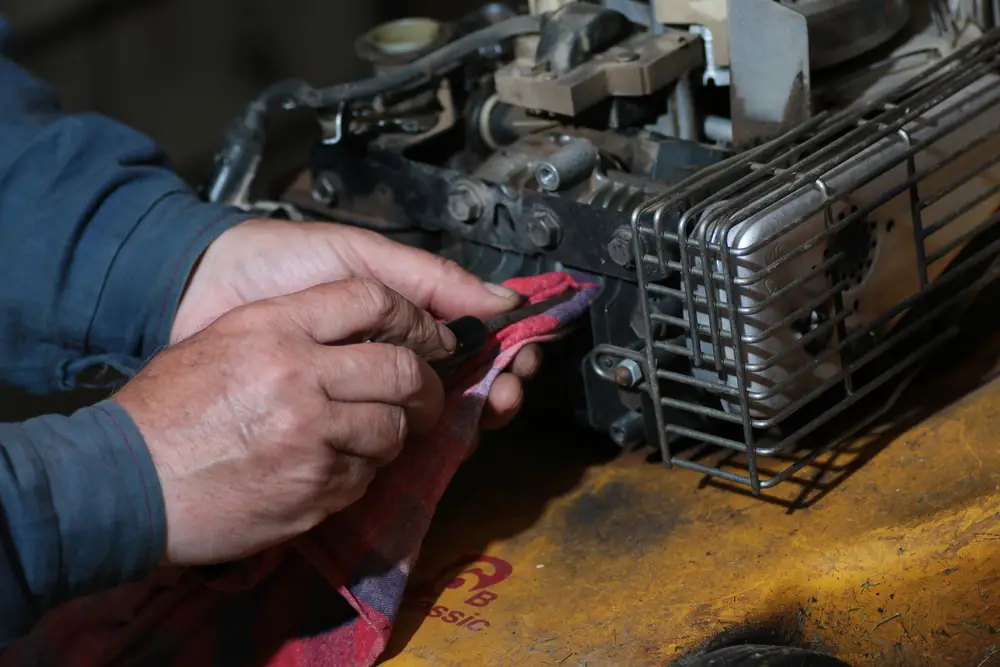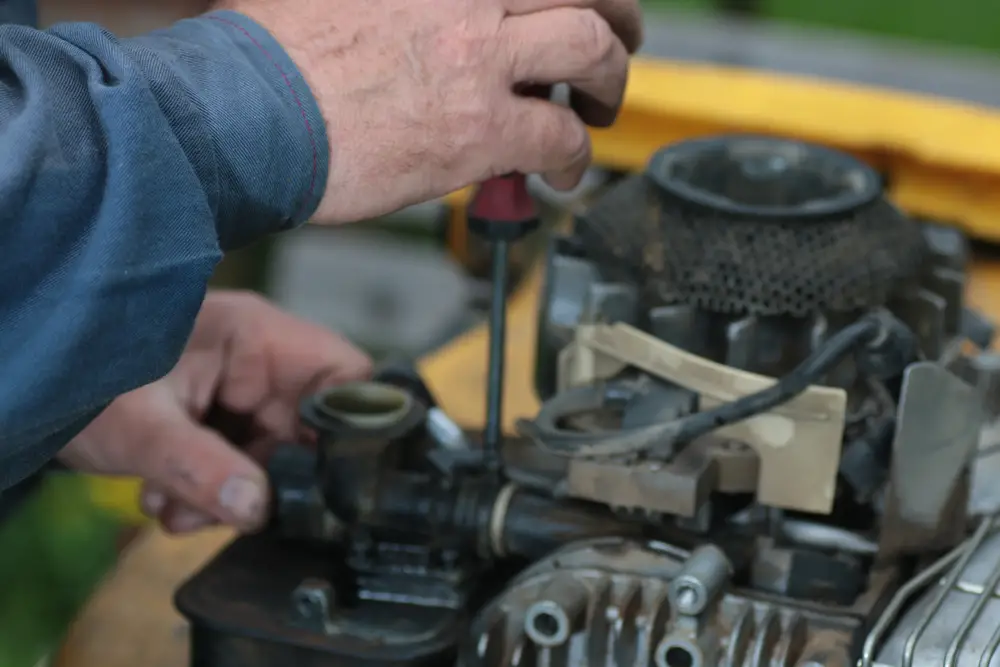Is your lawn mower hard to start, does it randomly misfire, or does it surge or sputter? If so, you may have an issue with your fuel lines. Debris or imperfections are typically the cause, which can lead to the engine not getting enough fuel. So, let’s talk about how to clean the lawn mower fuel line.
You can clean a lawn mower fuel line by hand or with additives. Cleaning additives (sometimes called fuel treatment) are preventative chemicals that will stop gunk from building up. Cleaning by hand removes anything that made its way into the fuel line.
In this content you’ll learn:
What Are The Signs That Lawn Mower Fuel Lines Need Cleaning?

There are several signs that lawn mower fuel lines need cleaning. First, starting the engine may be a problem since it doesn’t have the required fuel. Fluctuating revolutions per minute (RPMs, which are a measure of how fast a machine is working) at either idle or power tells you that the engine isn’t getting enough fuel.
Further, without enough fuel, the engine will have to work harder. Dirty fuel lines cause overheating, which could get hot enough to cause some damage to your lawn mower.
What Causes A Lawn Mower Fuel Line To Get Dirty?
The main causes of dirty fuel lines come from imperfections in fuel. Fuels, unfortunately, are not as clean as we would hope. Tiny particles in the fuel will, over time, collect and build up.
Debris will also find its way into the fuel tank and then into the fuel lines. Grass, other plants, and dirt are common debris found in fuel tanks. A fuel tank can also wear down over time, and there’s also the possibility of a poor fuel source being the cause.
How Do I Clean My Lawn Mower Fuel Line?
Now that you know the signs and reasons behind dirty fuel lines, let’s talk about how to clean them. We’ll start with using additives.
Cleaning With Additives
Additives (also known as fuel treatment) come in two main types: cleaners and stabilizers. Both are designed to prevent dirty fuel lines. Running the lawn mower engine will allow these additives to pass through the system and do their work.
They should be used according to the product recommendations.
Cleaning By Hand
Cleaning by hand becomes necessary if the additives aren’t working. Before starting this maintenance, we recommend putting on safety goggles and work gloves. Work in a well-ventilated space and make sure the lawn mower is on level ground.
Let’s start with removing the fuel line. Above all else, if you don’t feel comfortable doing anything below, we recommend contacting a professional for help.
Removing The Fuel Line
- Remove the fuel line starting from the lowest part of the fuel system.
- Loosen the pipe clips.
- Drain the fuel into a fuel can.
- Remove all other fuel lines between the carburetor and fuel tank.
- Remove the in-line fuel filter if present.
- Remove the in-line shutoff valve if present.
- Clean up any spilled fuel.
- Warning: be careful with flammable liquid and vapors.
- After removing the fuel line, use a pressurized injection cleaner to work cleaner through the fuel line.
- You can use a rigid wire instead to dislodge larger obstructions.
Replacing The Fuel Line
- Install the in-line fuel filter to the fuel line if present.
- Install the in-line shutoff valve to the fuel line if present.
- Reattach the fuel lines.
- Reattach the pipe clips.
- Refill the fuel tank.
- Look for any fuel leaks.
- Start the engine.
- Check again for any fuel leaks.
- Warning: be careful with flammable liquid and vapors.
How to Prevent Fuel Lines from Getting Dirty
Aside from using additives, there are other ways you can prevent your lawn mower’s fuel lines from getting dirty. One way is ensuring you purchase clean fuel. When pouring fuel, use a funnel with a filter to catch any debris, and if you find anything that looks out of place, we suggest using a different pump or gas station.
Additionally, check your surroundings before you start filling your lawn mower. Ensure that no debris can make its way into the tank during filling. For example, it’s never a good idea to fill a lawn mower when someone is using a leaf blower nearby. Filtering while filling will also help keep debris out.
Finally, check the inside of the fuel tank. Metal fuel tanks will degrade over time. Flaking coatings and rust will work their way into your fuel lines and cause problems. If your fuel tank doesn’t pass inspection, it’s best to replace it.
The best time to inspect your fuel tank is when it’s empty. Use a flashlight to give you better visibility, and look for signs of rust and flaking coating. As always, be careful when working with flammable fuel, vapors, and the equipment that uses such fuel.
What Happens If I Don’t Clean My Fuel Lines?
If you don’t clear fuel lines and choose to ignore the signs, the situation will only continue to get worse. Difficulty starting, random misfires, and engine surges will worsen, eventually resulting in a non-functioning lawn mower. This may lead to irreparable damages.
Conclusion: How To Clean The Lawn Mower Fuel Lines?
In conclusion, the process for how to clean a lawn mower fuel line is easy using additives or tools and a little labor. Keeping contaminants and debris out of the fuel line reduces the frequency of having to clean them. Following these steps will keep your fuel lines clean and your lawn mower running smoothly.
Once you get a chance to use some additives, let us know which ones you like best in the comments below!
Have issues with leaking oil and smoke? Check out what to do!
